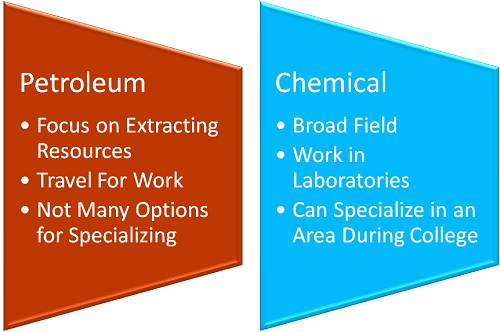There are many different kinds of engineers. Petroleum engineering is one of the highest-paying bachelor’s degrees. If you’re considering this occupation – and degree path – then you should consider how this discipline compares to other branches of engineering, such as chemical engineering. Some of the differences include the breadth of the field, the work settings in which you might find employment and the courses you will take in college to prepare for this occupation.
Differences in Breadth of the Work
IMAGE SOURCE: Pixabay, public domain
Engineering is all about designing solutions to problems, but different types of engineers focus on different industries, approaches and types of problems. Petroleum engineers are the engineers that focus on designing methods of extracting resources like oil and gas from existing wells and from beneath the Earth’s surface, the United States Bureau of Labor Statistics (BLS) reported. There are different kinds of petroleum engineers, such as drilling engineers, reservoir engineers, production engineers and completion engineers, but they all work toward the goal of safely and efficiently acquiring oil and gas resources.
The field of chemical engineering is much broader. Chemical engineers innovate solutions to problems in the production and use of all kinds of chemicals and compounds, the BLS reported. Everything from food products to pharmaceutical medications and clothing to paper may fall under the domain of a chemical engineer’s work. Chemical engineers also work with the chemicals used as fuels and in fuel production – which creates some overlap between the fields of petroleum and chemical engineering.
Collectively, chemical engineers have a much broader scope of work than petroleum engineers do, and a degree in chemical engineering is more versatile. However, within the chemical engineering profession, engineers often specialize in an area such as biomedical engineering, nanomaterials engineering or process engineering.
Although chemical engineering is a much broader field, the size of these occupations is comparable. The BLS reported a workforce of 33,500 petroleum engineers and 33,900 chemical engineers.
Distinct Work Environments
One of the biggest differences between petroleum and chemical engineering is where you would work in each of these fields. Chemical engineers spend much of their workday in laboratories or offices, the BLS reported. They work for many different industries. The top-employing industry for chemical engineering is research and development, but this field employs just 10 percent of the occupation. Other top-employing industries include engineering services, petroleum and coal products manufacturing, wholesale trade and pharmaceutical manufacturing.
For petroleum engineers, workplaces are much more interesting. Travel is a frequent component of the work, and petroleum engineers often work on-site at well and drilling sites, at least part of the time. Employment in the petroleum engineering occupation is much more concentrated in the top-employing industries. Nearly 30 percent of the profession works in the field of oil and gas extraction. Another 18 percent work in the management of companies and enterprises, 16 percent in mining support activities, 11 percent in petroleum and coal products manufacturing and 7 percent in engineering services.
The job outlook is better for chemical engineers than petroleum engineers. The BLS expects job opportunities to increase by 6 percent for chemical engineers, while petroleum engineers are looking at a slower than average job growth rate of 3 percent.
Differences in College Curricula
To become either a petroleum engineer or a chemical engineer, you’ll need a bachelor’s degree. Undergraduate college degree programs in either field of study involve completing core engineering coursework in subjects like thermodynamics, electrical circuits, statics and strength of materials. Although there’s some overlap in the courses taken by petroleum engineering majors and chemical engineering majors, these are distinct programs of study.
Generally, a college degree program in petroleum engineering includes more specialized coursework than one in chemical engineering. At the undergraduate level, you might take classes in petroleum drilling engineering, petroleum engineering design, drilling and well completion, drilling fluids, energy in the modern world and petroleum production. Because petroleum engineering is already a fairly specialized major, you may not have many options for specializing your degree at the undergraduate level. In this program of study, you will often round out your coursework with more general studies in chemical engineering.
The courses that are most common in chemical engineering programs include material and energy balances, momentum transfer, heat and mass transfer, process dynamics and control, kinetics and reactor design and chemical engineering design. Because the field of chemical engineering is so broad, students in this major often have the opportunity to choose an area of emphasis. Some possible concentrations within a chemical engineering program include material science, biomedical, premedical and environmental emphases. Students in a chemical engineering program may even have the opportunity to complete a petroleum engineering concentration.
Students pursuing a chemical engineering degree with a petroleum engineering emphasis combine the breadth of a chemical engineering curriculum with a smaller number of specialized courses that provide a glimpse into work in petroleum engineering.
Additional Resources
What Are the Benefits of Pursuing a Degree in Petroleum Engineering?


